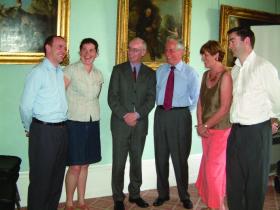Print Culture in the Eighteenth Century: Regional, National and International Perspectives
Published in 18th-19th Century Social Perspectives, 18th–19th - Century History, Issue 5 (Sep/Oct 2007), News, Volume 15
Conference participants (l. to r.): Dr Liam Chambers (Mary Immaculate College), Jennifer Moore (UL), Prof. Paul McCutcheon (UL), Prof. Robert Darnton (Harvard), Prof. Geraldine Sheridan (UL) and Michael Griffin (UL).
f
On 7–8 June 2007 a group of emerging scholars and established academics from a range of disciplinary backgrounds (history, English, French, Irish) gathered at the University of Limerick to discuss print culture in the eighteenth century. The linchpin of the event was a lecture by the well-known American cultural historian Robert Darnton. The conference reflected the current strong interest in ‘print culture’ among eighteenth-century scholars working in Ireland, an interest that views ‘print culture’ as something stretching beyond print itself to encompass authors, readers, distributors and ultimately the cultural, social and political worlds in which print is created and consumed. This development has clearly been influenced by Darnton’s work. By shifting our focus from what he has called the ‘canon of classics’, Professor Darnton and scholars like him have encouraged and facilitated eighteenth-century researchers to look beyond the heavyweight writers such as Jonathan Swift and Edmund Burke (important as they are) to explore the kind of people discussed at this conference: unheralded authors like Thomas Dermody (see HI 14.3, May/June 2006, pp 21–5) or the female poets publishing in Limerick newspapers, chap-book printers like William Goggin, and the news-hawkers, chapmen, peddlers, post boys, couriers and newspaper agents who ensured that print penetrated deep into rural Irish society. Professor Darnton has encouraged us to look beyond these too, to begin to think about the readers of provincial newspapers like the Munster Journal and the Limerick Chronicle. While he is best known for his work on eighteenth-century France, Darnton’s insights and methodologies transcend national boundaries. It was for this reason that the conference explored the regional, national and international dimensions of print culture, for the three are interrelated.
The research papers presented by Ursula Callaghan, Jennifer Moore, Sarah McNamara and Andrew Carpenter all demonstrated the potential of Limerick print culture. Michael Griffin extended this into County Clare. Máire Kennedy’s paper tackled the world of provincial printing in Munster and south Leinster. Jennifer Regan’s research provided a fascinating Dublin comparison, drawing on the rich archive of R. D. Webb and Sons. Other papers raised questions at a broader, national level: Eaton D’Arcy on the printing of selected 1641 depositions in the mid- to late seventeenth century; Johanna Archbold on the crucially important periodical press; James Kelly on state control of print and censorship; and Niall Ó Casáin on the Irish language. Geraldine Sheridan and Sierra Pierce supplied part of the international context by assessing images of working women and Voltaire on literary critics respectively. Professor Darnton’s plenary, ‘The Devil in the Holy Water, or the Art and Politics of Slander, Paris and London, 1770–1800’, provided a fascinating discussion of French libellées in the later eighteenth century.
The conference, which took place in the historic Plessey House on the UL campus during two days of beautiful weather, confirmed the current vibrancy of print culture research in Ireland.
Further information on the UL-MIC Eighteenth-Century Research Group: http://www.ul.ie/~lcs/lcs-research/research-centres/eighteenth-century-research-group/
















